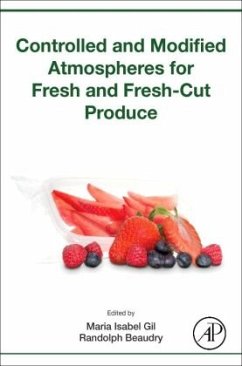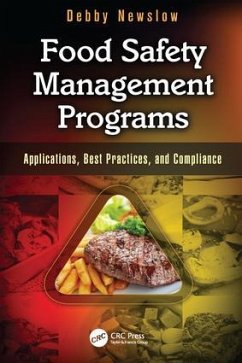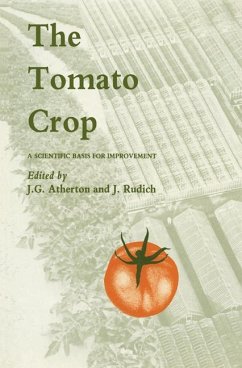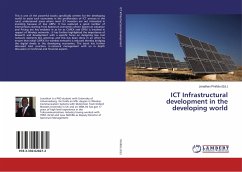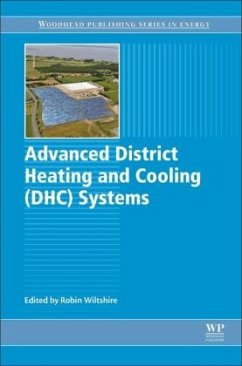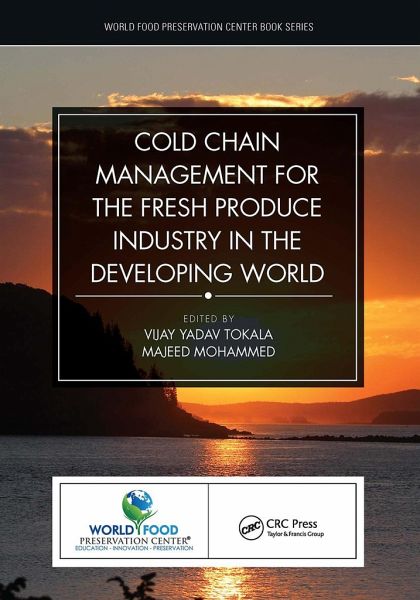
Cold Chain Management for the Fresh Produce Industry in the Developing World
Versandkostenfrei!
Versandfertig in 6-10 Tagen
66,99 €
inkl. MwSt.
Weitere Ausgaben:

PAYBACK Punkte
33 °P sammeln!
Global food losses are a result of a lack of necessary infrastructure, improper food safety handling procedures, and insufficient training for the personnel working in the cold chain. The development of a resource-efficient and energy-smart food supply chain requires a well-integrated evaluation and development of the cold chain. Cold Chain Management for the Fresh Produce Industry in the Developing World provides a comprehensive review of the benefits of an unbroken cold chain in developing countries and focuses on the critical role of extension education in the implementation of cold chain m...
Global food losses are a result of a lack of necessary infrastructure, improper food safety handling procedures, and insufficient training for the personnel working in the cold chain. The development of a resource-efficient and energy-smart food supply chain requires a well-integrated evaluation and development of the cold chain. Cold Chain Management for the Fresh Produce Industry in the Developing World provides a comprehensive review of the benefits of an unbroken cold chain in developing countries and focuses on the critical role of extension education in the implementation of cold chain management.
The unbroken cold chain is essential for all stakeholders in the fresh produce industry to maintain the quality and safety of food products during handling, transporting, and storing in their journey from producer to consumer. Appropriate cold chain management is crucial not only to reduce the postharvest losses and wastages, but also to increase farmers' income, generate employment opportunities, and improve the livelihood of stakeholders along the supply chain.
Key Features:
Includes case studies for promoting the expansion of existing technologies for cold chain development in Asian, Africa and the Caribbean nations.
Assesses cold chain management as crucial to the growth of global trade in perishable products with contributions from international organizations, researchers and commercial experts.
Articulates resilient, sustainable and creative concepts to develop cold chains to enhance food distribution.
This book comprises of chapters contributed by the experts and practitioners of cold chain development in developing countries. The authors in the book provide the scenario of cold chain management in the world and discuss the importance of the cold chain as well as the different options and innovations of cooling systems. Chapters also include case studies, success stories, capacity building activities, and other opportunities in cold chain development.
The unbroken cold chain is essential for all stakeholders in the fresh produce industry to maintain the quality and safety of food products during handling, transporting, and storing in their journey from producer to consumer. Appropriate cold chain management is crucial not only to reduce the postharvest losses and wastages, but also to increase farmers' income, generate employment opportunities, and improve the livelihood of stakeholders along the supply chain.
Key Features:
Includes case studies for promoting the expansion of existing technologies for cold chain development in Asian, Africa and the Caribbean nations.
Assesses cold chain management as crucial to the growth of global trade in perishable products with contributions from international organizations, researchers and commercial experts.
Articulates resilient, sustainable and creative concepts to develop cold chains to enhance food distribution.
This book comprises of chapters contributed by the experts and practitioners of cold chain development in developing countries. The authors in the book provide the scenario of cold chain management in the world and discuss the importance of the cold chain as well as the different options and innovations of cooling systems. Chapters also include case studies, success stories, capacity building activities, and other opportunities in cold chain development.





